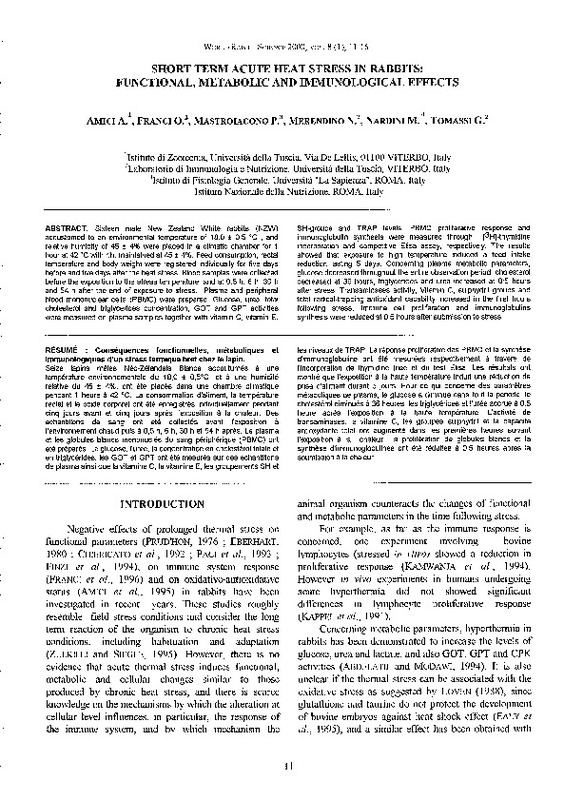JavaScript is disabled for your browser. Some features of this site may not work without it.
Buscar en RiuNet
Listar
Mi cuenta
Estadísticas
Ayuda RiuNet
Admin. UPV
SHORT TERM ACUTE HEAT STRESS IN RABBITS: FUNCTIONAL, METABOLIC AND IMMUNOLOGICAL EFFECTS
Mostrar el registro sencillo del ítem
Ficheros en el ítem
| dc.contributor.author | Amici, A.
|
|
| dc.contributor.author | Franci, O.
|
|
| dc.contributor.author | Mastroiacono, P.
|
|
| dc.contributor.author | Merendino, N.
|
|
| dc.contributor.author | Nardini, M.
|
|
| dc.contributor.author | Tomassi, G.
|
|
| dc.date.accessioned | 2011-03-11T08:20:32Z | |
| dc.date.available | 2011-03-11T08:20:32Z | |
| dc.date.issued | 2000 | |
| dc.identifier.issn | 1257-5011 | |
| dc.identifier.uri | http://hdl.handle.net/10251/10265 | |
| dc.description.abstract | [EN] Sixteen male New Zealand White rabbits (NZW) accustomed to an environmental temperature of 18.0 ± 0.5 ºC , and relative humidity of 45 ± 4% were placed in a climatic chamber for 1 hour at 42 ºC with r.h. maintained at 45 ± 4%. Feed consumption, rectal temperature and body weight were registered individually for five days before and five days after the heat stress. Blood samples were collected befare the exposition to the stress temperature, and at 0.5 h, 6 h, 30 h and 54 h after the end of exposure to stress. Plasma and peripheral blood mononuclear cells (PBMC) were prepared. Glucose, urea, total cholesterol and triglycerides concentration, GOT and GPT activities were measured on plasma samples together with vitamin C, vitamin E, SH-groups and TRAP levels. PBMC proliferative response and immunoglobulin synthesis were measured through ¡3H]-thymidine incorporation and competitive Elisa assay, respectively. The results showed that exposure to high temperature induced a feed intake reduction lasting 5 days. Concerning plasma metabolic parameters, glucose decreased throughout the entire observation period, cholesterol decreased at 36 hours, triglycerides and urea increased at 0·5 hours after stress. Transaminases activity, Vitamin C, sulphydril groups and total radical-trapping antioxidant capability increased in the first hours following stress. lmmune cell proliferation and immunoglobulins synthesis were reduced at 0·5 hours after submission to stress. | es_ES |
| dc.description.abstract | [FR] Seize lapins males Néo-Zélandais Blancs accoutumés a une température environnementale du 18,0 ± 0,5ºC, et a une humidité relative du 45 ± 4%, ont été placés dans une chambre climatique pendant 1 heure a 42 ºC. La consommation d'aliment, la température rectal et le poids corporel ont été enregistrés individuellement pendant cinq jours avant et cinq jours aprés l'exposition a la chaleur. Des échantillons de sang ont été collectés avant l'exposition a l'environnement chaud puis a 0,5 h, 6 h, 30 h et 54 h aprés. Le plasma et les globules blancs mononuclés du sang périphérique (PBMC) ont été préparés. Le glucose, l'urée, la concentration en cholestérol totale et en triglycérides, les GOT et GPT ont été mesurés sur des échantillons de plasma ainsi que la vitamine C, la vitamine E, les groupements SH et les niveaux de TRAP. La réponse proliferative des PBMC et la synthése d'immunoglobuline ont été mesurées respectivement a travers de l'incorporation de thymidine triée et du test Elisa. Les résultats ont montré que l'exposition a la haute température induit une réduction de prise d'aliment durant 5 jours. Pour ce qui concerne des paramétres métaboliques de plasma, le glucose a diminué dans tout la période, le cholestérol diminués a 36 heures, les trjglycérides et l'urée accrue a 0,5 heure aprés l'exposition a la haute température. L'activité de transaminases, la vitamine c. les groupes sulphydril et la capacité antioxydante total ont augmenté dans les premiéres heures suivant l'exposition a la chaleur. La prolifération de globules blancs et la synthése d'immunoglobulines ont été réduites a 0,5 heures aprés la soumission a la chaleur. | |
| dc.language | Inglés | es_ES |
| dc.publisher | World Rabbit Science. ICTA. UPV | es_ES |
| dc.relation.ispartof | World Rabbit Science | |
| dc.rights | Reserva de todos los derechos | es_ES |
| dc.title | SHORT TERM ACUTE HEAT STRESS IN RABBITS: FUNCTIONAL, METABOLIC AND IMMUNOLOGICAL EFFECTS | es_ES |
| dc.type | Artículo | es_ES |
| dc.date.updated | 2011-03-09T09:41:10Z | |
| dc.identifier.doi | 10.4995/wrs.2000.412 | |
| dc.rights.accessRights | Abierto | es_ES |
| dc.description.bibliographicCitation | Amici, A.; Franci, O.; Mastroiacono, P.; Merendino, N.; Nardini, M.; Tomassi, G. (2000). SHORT TERM ACUTE HEAT STRESS IN RABBITS: FUNCTIONAL, METABOLIC AND IMMUNOLOGICAL EFFECTS. World Rabbit Science. 08(1). https://doi.org/10.4995/wrs.2000.412 | es_ES |
| dc.description.accrualMethod | SWORD | es_ES |
| dc.relation.publisherversion | https://doi.org/10.4995/wrs.2000.412 | |
| dc.description.volume | 08 | |
| dc.description.issue | 1 | |
| dc.identifier.eissn | 1989-8886 | es_ES |








